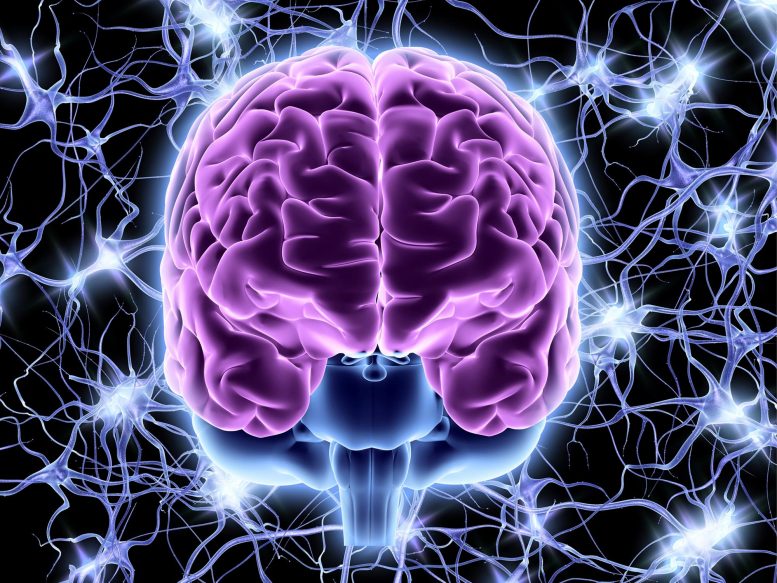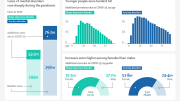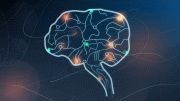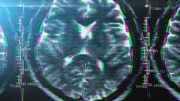
The findings could improve the early detection of depression.
A recent study has discovered that changes in our brain patterns, which shape our trust behavior, can serve as an early warning sign for depression, even before symptoms become noticeable. Just like how unusual behavior from our devices can indicate the presence of malware, changes in our trust behavior can alert us to the possibility of depression sneaking up on us.
Brain scans showed a correlation between shrunken gray matter volumes in the “social brain” regions, responsible for social cognition, and a decreased ability to trust, which is linked to an increased vulnerability to depression. This finding could assist in the early detection of depression. The study’s findings were published in the journal Scientific Reports.
“Our question was: Can we use social personality information to predict the development of mental disorders, such as depression?” Alan S. R. Fermin, the study’s corresponding author and assistant professor (special appointment) at Hiroshima University’s Center for Brain, Mind and KANSEI Sciences Research, said.
“Having tools that help identify early signs of mental disorders could accelerate medical or other therapeutical interventions.”
Major depressive disorder (MDD), or clinical depression, is a pervasive mental health condition affecting millions worldwide. Despite serious symptoms that interfere with daily life, many people, for various reasons, delay seeking medical help which leads to worsened conditions. When severe signs of MDD are already visible, doctors could easily come up with a diagnosis. But at that stage, treatment can get more challenging as response to medications is reduced, thus requiring more aggressive interventions.
While their findings add to previous studies that showed a connection between trust and depression, they were the first to uncover the neuroanatomical basis of this relationship.
Trusting is associated with the expectation of kindness and reciprocation of cooperation from others as well as compliance with social norms. However, trusting others is not an easy task as unexpected aversive social interactions are often observed in different environmental settings, such as gossip or bullying at school, harassment at work, or even physical violence at home. Breach of trust and individual differences in trusting others have been shown to harm mental health as low trusters tend to isolate themselves from social interactions and, consequently, develop depression.
“In our study, we not only replicated the association between low trust and depression but also demonstrated that brain regions associated with trust were also associated with the degree of depressive symptoms one year in advance,” Fermin said.
“Overall, we found that the brains of lower trusters showed reduced gray matter volume in brain regions involved in social cognition. Also, we found that this gray matter volume reduction among low trusters was similar to the brain of actual depressive patients. Thus, even though our participants hadn’t received any diagnosis of depression, their brains were already showing signs of depression.”
Structural neuroimaging analyses by the researchers showed both low trust and high depressive symptoms are linked to reduced gray matter volumes in the brain’s bilateral angular gyrus, bilateral dorsolateral prefrontal cortex, bilateral dorsomedial prefrontal cortex, bilateral precuneus, ventromedial prefrontal cortex (right frontal pole and right rectus gyrus), and the left posterior cingulate cortex. Whole-brain voxel-based morphometry analysis of their study sample also showed that when trust levels dwindle, gray matter volume in the parahippocampus-amygdala region also shrivels.
These are brain regions that help humans control their emotions, think, and predict others’ mental states and behaviors. Thus, the reduced volume of these brain regions in low trusters suggests possible disturbances in emotion control and in the estimation of others’ trustworthiness, which may contribute to the development of depression.
What causes these brain regions to shrink, however, is still unknown.
To better understand the neuroanatomical connection between trust and depression vulnerability, the researchers used magnetic resonance imaging to look at the gray matter volume from 470 healthy participants living in and around Machida, a suburb of Tokyo, Japan. They then used psychological questionnaires to measure trust, social anxiety, and social network size. Participants were also asked to self-report depression symptoms they might be experiencing through a psychiatric questionnaire as an indicator of MDD vulnerability.
To validate their findings, the researchers recruited 185 participants who were outpatients at Hiroshima University Hospital and other medical institutions in Hiroshima Prefecture. They looked at gray matter volume abnormalities in 81 of the participants who were diagnosed with clinical depression to see if brain regions linked to trust and depressive symptoms are indeed related to actual neuroanatomical abnormalities commonly observed in MDD patients.
“We hope that our findings could support the development of institutional and social policies to increase social trust — for example, at work, school, or public space — and prevent the development of mental disorders,” Fermin said.
The researchers are planning to find out what other personality types could be used as biosocial markers in predicting the onset of mental disorders.
Reference: “The neuroanatomy of social trust predicts depression vulnerability” by Alan S. R. Fermin, Toko Kiyonari, Yoshie Matsumoto, Haruto Takagishi, Yang Li, Ryota Kanai, Masamichi Sakagami, Rei Akaishi, Naho Ichikawa, Masahiro Takamura, Satoshi Yokoyama, Maro G. Machizawa, Hui-Ling Chan, Ayumu Matani, Shigeto Yamawaki, Go Okada, Yasumasa Okamoto and Toshio Yamagishi, 6 October 2022, Scientific Reports.
DOI: 10.1038/s41598-022-20443-w
The study was a collaboration among researchers at HU’s Center for Brain, Mind and Kansei Sciences Research and Department of Psychiatry and Neuroscience, Aoyama Gakuin University’s School of Social Informatics, Tamagawa University’s Brain Science Institute, Riken Center for Brain Science’s Social Value Decision Making Unit, and Araya Inc.’s Department of Neuroinformatics.
The study was funded by the Japan Society for the Promotion of Science, theJapan Agency for Medical Research and Development, and the Moonshot Research and Development Program.









Be the first to comment on "Compromised “Trust Settings” – An Early Warning of Lurking Depression"